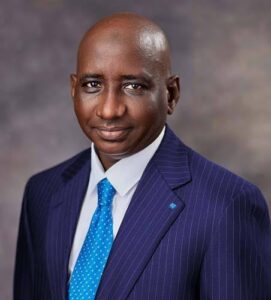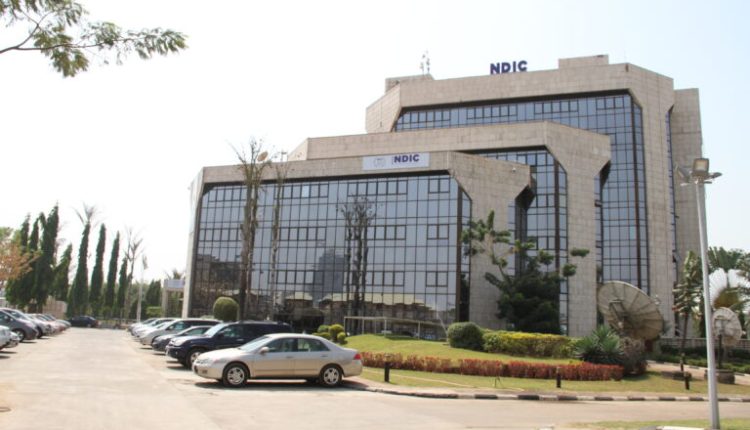FORMER SENATOR FIGHTS NDIC DIRTY OVER 4.76 BILLION NAIRA BANANA ISLAND PROPERTY, AS CORPORATION REFUSES TO RELEASE DOCUMENTS FOR PROPERTY PAID FOR

A major property transaction involving the Nigeria Deposit Insurance Corporation (NDIC) and former lawmaker Senator Farouk Bello Bunza has escalated into a high-stakes dispute that may soon be headed to court, potentially dragging the corporation into a widening controversy over transparency, due process, and alleged political interference.
Barring a last-minute resolution at a meeting reportedly scheduled in Abuja this week, the senator is preparing to file a lawsuit challenging NDIC’s refusal to release title documents to a premium ₦4.76 billion Banana Island property he insists he has fully paid for.
The NDIC, acting as liquidator for the defunct Heritage Bank, claims the sale to Bunza is no longer valid due to alleged breaches of contract. The senator strongly disputes this, accusing the corporation of “banditry in high places” and hinting at a ploy by powerful interests to snatch the prime Lagos property.
Senator Bunza: “NDIC Is Acting Like an Ordinary Con Man”
Speaking to journalists in Abuja over the weekend, Senator Bunza — who represented Kebbi Central between 2003 and 2007 — insisted he complied with every financial obligation required to complete the transaction.
The property in dispute is located at Plot 55, Zone J, Federal Government Layout, Banana Island, Ikoyi, one of the most valuable residential enclaves in Nigeria.
Bunza stated he had paid for the property in three tranches, totalling ₦4.76 billion:
• ₦833,333,303
• ₦1,777,777,777
• ₦2,148,888,888.91 (paid on November 20, 2025)
According to him, the NDIC had earlier agreed to release the title documents upon payment of the outstanding balance — a commitment his financiers at Coronation Merchant Bank relied on in processing his facility.
However, a day after the final payment, NDIC wrote to the bank retracting its previous undertaking.
“Coronation relied on NDIC’s earlier undertaking to make the payment. They cannot retract it now. How is NDIC now different from an ordinary con man on the streets?” Bunza asked.
He accused the corporation of undermining investor confidence, saying:
“If we were in a decent country, the Managing Director of NDIC and his underlings would have preferred resignation to issuing this retraction letter.”
The senator also dismissed insinuations of wrongdoing on his part: “I did not steal from the government. I won’t allow myself to be defrauded by the system.”
NDIC: “The Contract Is Terminated — We Are Only Offering a Refund”
In a lengthy official statement the NDIC presented a sharply different version of events.
The corporation argued that the initial 2024 agreement between Senator Bunza and Heritage Bank was unfair to stakeholders, especially because:
• The property was mortgaged by a debtor owing the bank ₦35.79 billion.
• Though the debtor lost cases up to the Supreme Court, there remains a possibility the appeal could be refiled.
• NDIC’s valuation pegged the property’s worth at ₦7.005 billion, significantly higher than the original ₦4.5 billion sale price.
Consequently, NDIC said it re-offered the property to the senator at the revised valuation. Bunza rejected this.
A second valuation in 2025 — prompted by changes to waterfront land reclamation — brought the offer down to ₦4.76 billion, which aligns with the amount the senator eventually paid.
However, NDIC insists the revised offer included strict conditions, which the former senator allegedly failed to fulfil:
• Submission of a formal acceptance letter
• Signing a Deed of Undertaking authorizing NDIC to debit his accounts in case of default
• Acceptance of the property on an “as-is” basis, including complications around the title documents
• Strict installment timelines
NDIC claimed:
• Bunza paid the September 2025 instalment of ₦1.777 billion
• But refused to accept or acknowledge the accompanying letter reminding him of unmet conditions
• His non-compliance “automatically terminated the offer”
The agency concluded:
“The offer remains rescinded, and the sum of ₦2.611bn earlier deposited by Senator Bunza shall be refunded upon submission of account details.”
Title Documents: NDIC Blames EFCC, Senator Calls It a “Volte-Face”
A crucial element of the dispute concerns where the property’s original title documents actually are.
NDIC now says the documents are:
• Not in the corporation’s custody, contrary to earlier assurances
• Allegedly with the EFCC or with an erstwhile director of the defunct bank
The sudden reversal has drawn public ridicule, with commentators questioning how NDIC could negotiate and re-offer a property without possessing its documents.
Whispers of High-Level Interference
Sources familiar with the matter say another influential senator and a serving minister from the South-West may be interested in the same property.
There are suggestions these individuals are pressuring NDIC to invalidate Bunza’s transaction so the property can be rerouted to them.
Bunza hinted at this when he said the system was being weaponised to dispossess him.
Everyday.ng reviewed a set of transaction letters made available by the senator showing timelines of payments, undertakings, and communications with the bank.
Coronation Merchant Bank Dragged Into Crossfire
The conflict intensified when NDIC — after allegedly assuring Coronation that documents would be released — wrote a formal retraction to the bank, instructing it to disregard the earlier undertaking.
A representative of the senator, who visited NDIC headquarters to pick up the November 19 letter, reportedly declined to collect it after phoning the former lawmaker.
Legal Showdown Imminent
If this week’s meeting fails, the senator is prepared to sue NDIC for:
• Breach of contract
• Failure to honour an undertaking
• Wrongful retraction of commitments
• Attempted deprivation of property
His lawyers are reportedly examining whether the corporation’s actions constitute administrative misconduct or malicious interference.
Meanwhile, stakeholders in the financial sector warn that the NDIC’s handling of the case could have broader implications for:
• Buyer confidence in distressed-asset sales
• The integrity of regulatory institutions
• The ongoing liquidation of Heritage Bank
Three key questions remain unanswered:
• Can NDIC legally rescind an agreement after accepting full payment?
• Why were undertakings issued when the title documents were allegedly not in NDIC’s possession?
• Will political interests ultimately dictate the outcome?
For now, the dispute remains unresolved — and unless both parties find a compromise, a courtroom battle may soon determine who truly owns one of Banana Island’s most coveted plots


